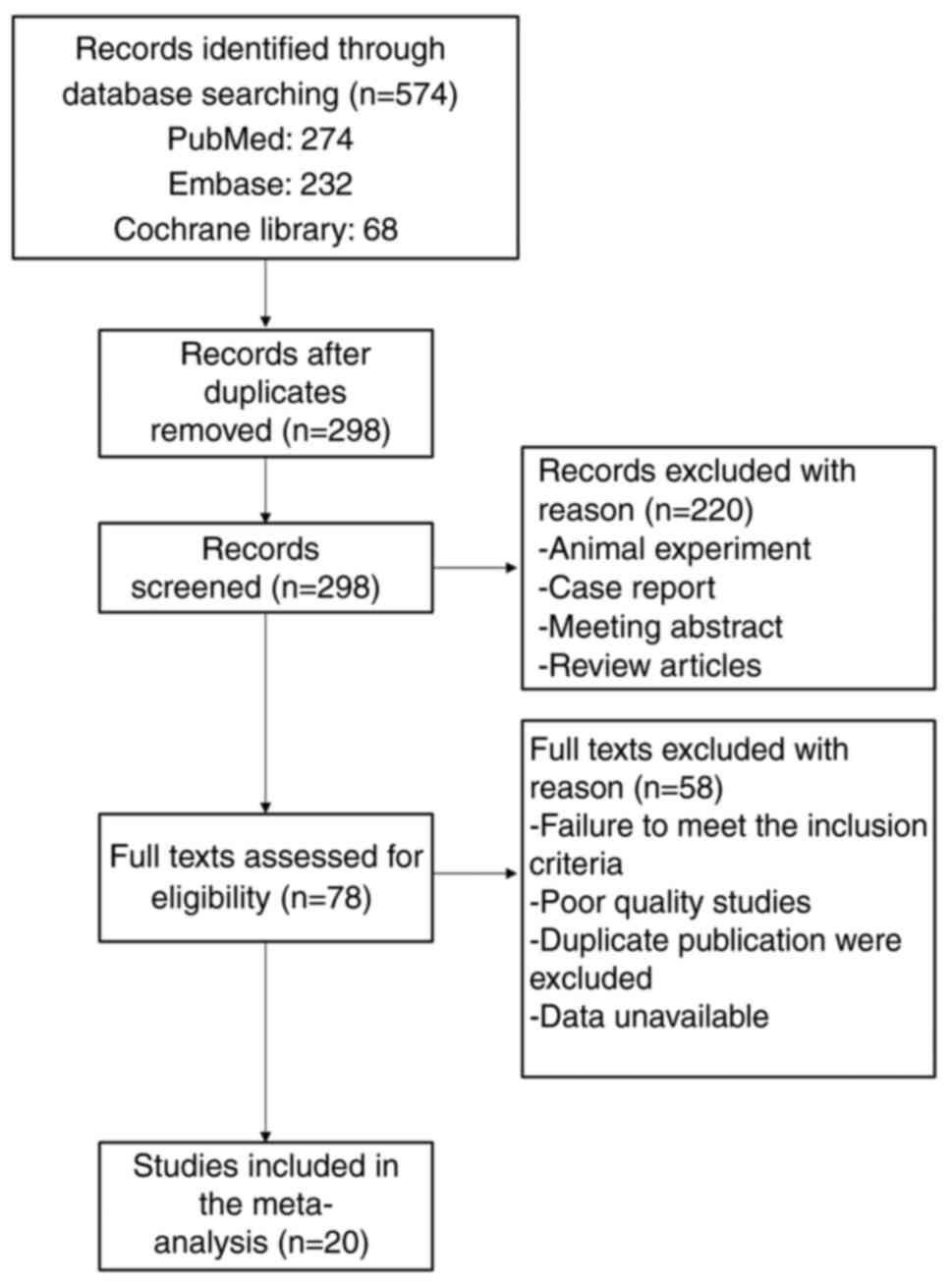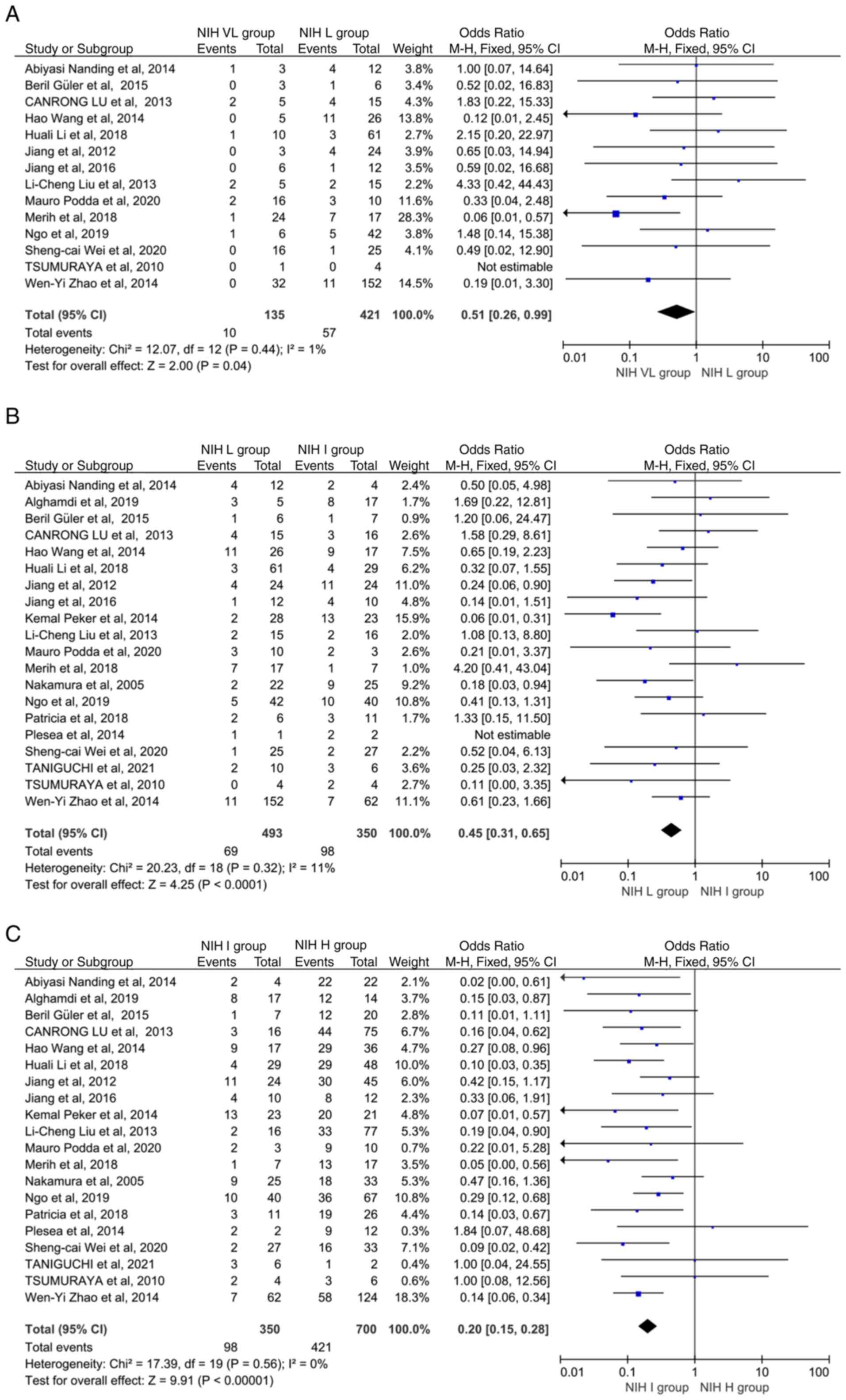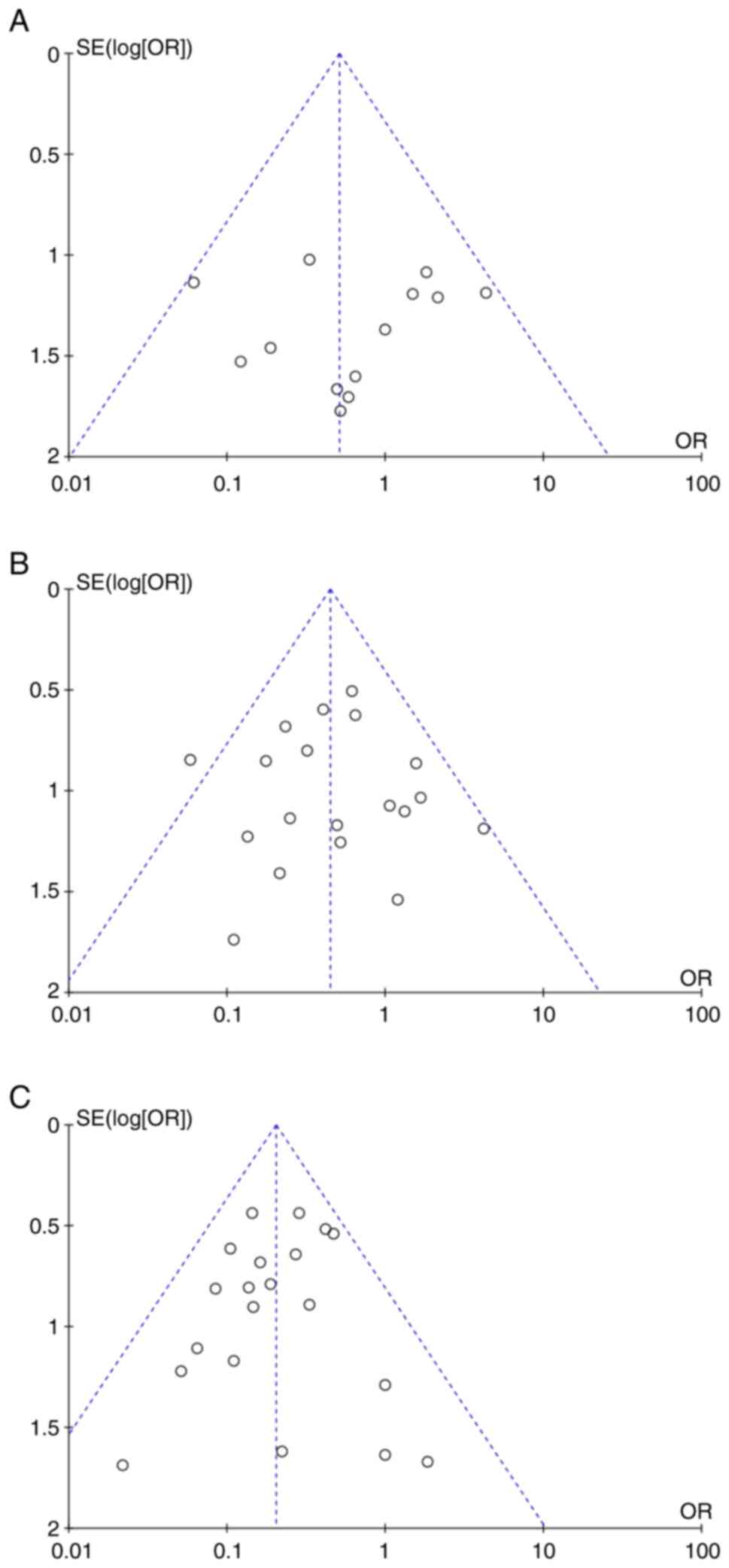|
1
|
El-Menyar A, Mekkodathil A and Al-Thani H:
Diagnosis and management of gastrointestinal stromal tumors: An
up-to-date literature review. J Cancer Res Ther. 13:889–900.
2017.PubMed/NCBI
|
|
2
|
Schaefer IM, Mariño-Enríquez A and
Fletcher JA: What is new in gastrointestinal stromal tumor? Adv
Anat Pathol. 24:259–267. 2017. View Article : Google Scholar : PubMed/NCBI
|
|
3
|
Nishida T, Blay JY, Hirota S, Kitagawa Y
and Kang YK: The standard diagnosis, treatment, and follow-up of
gastrointestinal stromal tumors based on guidelines. Gastric
Cancer. 19:3–14. 2016. View Article : Google Scholar : PubMed/NCBI
|
|
4
|
Demetri GD, von Mehren M, Antonescu CR,
DeMatteo RP, Ganjoo KN, Maki RG, Pisters PW, Raut CP, Riedel RF,
Schuetze S, et al: NCCN task force report: Update on the management
of patients with gastrointestinal stromal tumors. J Natl Compr Canc
Netw. 8 (Suppl 2):S1–S44. 2010. View Article : Google Scholar : PubMed/NCBI
|
|
5
|
Miettinen M and Lasota J: Histopathology
of gastrointestinal stromal tumor. J Surg Oncol. 104:865–873. 2011.
View Article : Google Scholar : PubMed/NCBI
|
|
6
|
van der Graaf WTA, Tielen R, Bonenkamp JJ,
Lemmens V, Verhoeven RHA and de Wilt JHW: Nationwide trends in the
incidence and outcome of patients with gastrointestinal stromal
tumour in the imatinib era. Br J Surg. 105:1020–1027. 2018.
View Article : Google Scholar : PubMed/NCBI
|
|
7
|
Ma GL, Murphy JD, Martinez ME and Sicklick
JK: Epidemiology of gastrointestinal stromal tumors in the era of
histology codes: Results of a population-based study. Cancer
Epidemiol Biomarkers Prev. 24:298–302. 2015. View Article : Google Scholar : PubMed/NCBI
|
|
8
|
Joensuu H: Risk stratification of patients
diagnosed with gastrointestinal stromal tumor. Hum Pathol.
39:1411–1419. 2008. View Article : Google Scholar : PubMed/NCBI
|
|
9
|
Kitamura Y: Gastrointestinal stromal
tumors: Past, present, and future. J Gastroenterol. 43:499–508.
2008. View Article : Google Scholar : PubMed/NCBI
|
|
10
|
Scholzen T and Gerdes J: The Ki-67
protein: From the known and the unknown. J Cell Physiol.
182:311–322. 2000. View Article : Google Scholar : PubMed/NCBI
|
|
11
|
Isola J, Helin H and Kallioniemi OP:
Immunoelectron-microscopic localization of a
proliferation-associated antigen Ki-67 in MCF-7 cells. Histochem J.
22:498–506. 1990. View Article : Google Scholar : PubMed/NCBI
|
|
12
|
du Manoir S, Guillaud P, Camus E,
Seigneurin D and Brugal G: Ki-67 labeling in postmitotic cells
defines different Ki-67 pathways within the 2c compartment.
Cytometry. 12:455–463. 1991. View Article : Google Scholar : PubMed/NCBI
|
|
13
|
Hutchins JR, Toyoda Y, Hegemann B, Poser
I, Hériché JK, Sykora MM, Augsburg M, Hudecz O, Buschhorn BA,
Bulkescher J, et al: Systematic analysis of human protein complexes
identifies chromosome segregation proteins. Science. 328:593–599.
2010. View Article : Google Scholar : PubMed/NCBI
|
|
14
|
Visapää H, Bui M, Huang Y, Seligson D,
Tsai H, Pantuck A, Figlin R, Rao JY, Belldegrun A, Horvath S and
Palotie A: Correlation of Ki-67 and gelsolin expression to clinical
outcome in renal clear cell carcinoma. Urology. 61:845–850. 2003.
View Article : Google Scholar : PubMed/NCBI
|
|
15
|
Li H, Ren G, Cai R, Chen J, Wu X and Zhao
J: A correlation research of Ki67 index, CT features, and risk
stratification in gastrointestinal stromal tumor. Cancer Med.
7:4467–4474. 2018. View Article : Google Scholar : PubMed/NCBI
|
|
16
|
Zhang H and Liu Q: Prognostic indicators
for gastrointestinal stromal tumors: A review. Transl Oncol.
13:1008122020. View Article : Google Scholar : PubMed/NCBI
|
|
17
|
Wang JP, Liu L, Li ZA, Wang Q, Wang XY and
Lin J: Ki-67 labelling index is related to the risk classification
and prognosis of gastrointestinal stromal tumours: A retrospective
study. Gastroenterol Hepatol. 44:103–114. 2021.(In English,
Spanish). View Article : Google Scholar : PubMed/NCBI
|
|
18
|
Liu X, Qiu H, Zhang P, Feng X, Chen T, Li
Y, Tao K, Li G, Sun X and Zhou Z; China Gastrointestinal Stromal
Tumor Study Group (CN-GIST), : Ki-67 labeling index may be a
promising indicator to identify ‘very high-risk’ gastrointestinal
stromal tumor: A multicenter retrospective study of 1022 patients.
Hum Pathol. 74:17–24. 2018. View Article : Google Scholar : PubMed/NCBI
|
|
19
|
Sahin S, Ekinci O, Seckin S and Dursun A:
Proliferation markers RacGAP1 and Ki-67 in gastrointestinal stromal
tumors by immunohistochemistry with respect to clinicopathological
features and different risk stratification systems. Int J Clin Exp
Pathol. 10:11723–11736. 2017.PubMed/NCBI
|
|
20
|
Demir L, Ekinci N, Erten C, Kucukzeybek Y,
Alacacioglu A, Somali I, Can A, Dirican A, Bayoglu V, Akyol M, et
al: Does immunohistochemistry provide additional prognostic data in
gastrointestinal stromal tumors? Asian Pac J Cancer Prev.
14:4751–4758. 2013. View Article : Google Scholar : PubMed/NCBI
|
|
21
|
Zhou Y, Hu W, Chen P, Abe M, Shi L, Tan
SY, Li Y and Zong L: Ki67 is a biological marker of malignant risk
of gastrointestinal stromal tumors: A systematic review and
meta-analysis. Medicine (Baltimore). 96:e79112017. View Article : Google Scholar : PubMed/NCBI
|
|
22
|
Nakamura N, Yamamoto H, Yao T, Oda Y,
Nishiyama K, Imamura M, Yamada T, Nawata H and Tsuneyoshi M:
Prognostic significance of expressions of cell-cycle regulatory
proteins in gastrointestinal stromal tumor and the relevance of the
risk grade. Hum Pathol. 36:828–837. 2005. View Article : Google Scholar : PubMed/NCBI
|
|
23
|
Pleşea IE, Chiuţu L, Bordu SI, Georgescu
I, Georgescu EF, Ciobanu D, Mărgăritescu ND, Comănescu V and Nemeş
R: Gastrointestinal stromal tumors-a clinical-morphological study
on 15 cases. Rom J Morphol Embryol. 55 (Suppl 2):S513–S523.
2014.PubMed/NCBI
|
|
24
|
Peker K, Sayar I, Gelincik I, Bulut G,
Kökenek Ünal TD, Şenol S, Gökçe A and Isik A: The diagnostic
importance of matrix metalloproteinase-7 and nestin in
gastrointestinal stromal tumors. Med Sci Monit. 20:674–680. 2014.
View Article : Google Scholar : PubMed/NCBI
|
|
25
|
Tsumuraya M, Kato H, Miyachi K, Sasaki K,
Tsubaki M, Akimoto K and Sunagawa M: Comprehensive analysis of
genes involved in the malignancy of gastrointestinal stromal
tumors. Anticancer Res. 30:2705–2715. 2010.PubMed/NCBI
|
|
26
|
Jiang L, Cao M, Hu J and Chen J:
Expression of PIN1 in gastrointestinal stromal tumours and its
clinical significance. Anticancer Res. 36:1275–1280.
2016.PubMed/NCBI
|
|
27
|
Güler B, Özyılmaz F, Tokuç B, Can N and
Taştekin E: Histopathological features of gastrointestinal stromal
tumors and the contribution of DOG1 expression to the diagnosis.
Balkan Med J. 32:388–396. 2015. View Article : Google Scholar : PubMed/NCBI
|
|
28
|
Wang H, Chen P, Liu XX, Zhao W, Shi L, Gu
XW, Zhu CR, Zhu HH and Zong L: Prognostic impact of
gastrointestinal bleeding and expression of PTEN and Ki-67 on
primary gastrointestinal stromal tumors. World J Surg Oncol.
12:892014. View Article : Google Scholar : PubMed/NCBI
|
|
29
|
Zhao WY, Xu J, Wang M, Zhang ZZ, Tu L,
Wang CJ, Lin TL, Shen YY, Liu Q and Cao H: Prognostic value of Ki67
index in gastrointestinal stromal tumors. Int J Clin Exp Pathol.
7:2298–2304. 2014.PubMed/NCBI
|
|
30
|
Nanding A, Tang L, Cai L, Chen H, Geng J,
Liu X, Ning X, Li X and Zhang Q: Low ING4 protein expression
detected by paraffin-section immunohistochemistry is associated
with poor prognosis in untreated patients with gastrointestinal
stromal tumors. Gastric Cancer. 17:87–96. 2014. View Article : Google Scholar : PubMed/NCBI
|
|
31
|
Lu C, Liu L, Wu X and Xu W: CD133 and
Ki-67 expression is associated with gastrointestinal stromal tumor
prognosis. Oncol Lett. 6:1289–1294. 2013. View Article : Google Scholar : PubMed/NCBI
|
|
32
|
Segales-Rojas P, Lino-Silva LS,
Aguilar-Cruz E and Salcedo-Hernández RA: Association of ki67 index
with recurrence in gastrointestinal stromal tumors. J Gastrointest
Cancer. 49:543–547. 2018. View Article : Google Scholar : PubMed/NCBI
|
|
33
|
Jiang J and Cao XY, Suo J, Wang YP, He L
and Cao XY: Evaluation of malignancy using Ki-67, p53, EGFR and
COX-2 expressions in gastrointestinal stromal tumors. World J
Gastroenterol. 18:2569–2575. 2012. View Article : Google Scholar : PubMed/NCBI
|
|
34
|
Liu LC, Xu WT, Wu X, Zhao P, Lv YL and
Chen L: Overexpression of carbonic anhydrase II and Ki-67 proteins
in prognosis of gastrointestinal stromal tumors. World J
Gastroenterol. 19:2473–2480. 2013. View Article : Google Scholar : PubMed/NCBI
|
|
35
|
Alghamdi HM, Amr SS, Shawarby MA, Sheikh
SS, Alsayyah AA, Alamri AM, Ismail MH, Almarhabi A, Alrefaee MA and
Ahmed MI: Gastrointestinal stromal tumors. A clinicopathological
study. Saudi Med J. 40:126–130. 2019. View Article : Google Scholar : PubMed/NCBI
|
|
36
|
Ngo QD, Pham QT, Phan DAT, Hoang AV, Hua
TNH and Nguyen ST: Molecular and clinicopathological features of
gastrointestinal stromal tumors in vietnamese patients. J Pathol
Transl Med. 53:361–368. 2019. View Article : Google Scholar : PubMed/NCBI
|
|
37
|
Podda M, Ferraro G, Di Saverio S, Cois A,
Nardello O, Poillucci G, Marino MV and Pisanu A: Association
between gastrointestinal stromal tumors and other malignancies: It
is only a matter of time ? A case series and an overview of
systematic reviews. J Gastrointest Cancer. 51:914–924. 2020.
View Article : Google Scholar : PubMed/NCBI
|
|
38
|
Tepeoğlu M, Özgün G, Tunca MZ, Tezcaner T
and Özdemir BH: Gastrointestinal stromal tumors: A
clinicopathological and immunohistochemical study of 65 cases. Turk
Patoloji Derg. 34:207–214. 2018.PubMed/NCBI
|
|
39
|
Wei SC, Xu L, Li WH, Li Y, Guo SF, Sun XR
and Li WW: Risk stratification in GIST: Shape quantification with
CT is a predictive factor. Eur Radiol. 30:1856–1865. 2020.
View Article : Google Scholar : PubMed/NCBI
|
|
40
|
Taniguchi K, Suzuki A, Serizawa A, Kotake
S, Ito S, Suzuki K, Yamada T, Noguchi T, Amano K, Ota M, et al:
Rapid flow cytometry of gastrointestinal stromal tumours closely
matches the modified fletcher classification. Anticancer Res.
41:131–136. 2021. View Article : Google Scholar : PubMed/NCBI
|
|
41
|
Joensuu H, Hohenberger P and Corless CL:
Gastrointestinal stromal tumour. Lancet. 382:973–983. 2013.
View Article : Google Scholar : PubMed/NCBI
|
|
42
|
McCarter MD, Antonescu CR, Ballman KV,
Maki RG, Pisters PW, Demetri GD, Blanke CD, von Mehren M, Brennan
MF, McCall L, et al: Microscopically positive margins for primary
gastrointestinal stromal tumors: Analysis of risk factors and tumor
recurrence. J Am Coll Surg. 215:53–60. 2021. View Article : Google Scholar : PubMed/NCBI
|
|
43
|
Gold JS, Gönen M, Gutiérrez A, Broto JM,
García-del-Muro X, Smyrk TC, Maki RG, Singer S, Brennan MF,
Antonescu CR, et al: Development and validation of a prognostic
nomogram for recurrence-free survival after complete surgical
resection of localised primary gastrointestinal stromal tumour: A
retrospective analysis. Lancet Oncol. 10:1045–1052. 2009.
View Article : Google Scholar : PubMed/NCBI
|
|
44
|
Zhi X, Zhou X, Wang W and Xu Z: Practical
role of mutation analysis for imatinib treatment in patients with
advanced gastrointestinal stromal tumors: A meta-analysis. PLoS
One. 8:e792752013. View Article : Google Scholar : PubMed/NCBI
|
|
45
|
Yan L, Zou L, Zhao W, Wang Y, Liu B, Yao H
and Yu H: Clinicopathological significance of c-KIT mutation in
gastrointestinal stromal tumors: A systematic review and
meta-analysis. Sci Rep. 5:137182015. View Article : Google Scholar : PubMed/NCBI
|
|
46
|
Wozniak A, Rutkowski P, Schöffski P,
Ray-Coquard I, Hostein I, Schildhaus HU, Le Cesne A, Bylina E,
Limon J, Blay JY, et al: Tumor genotype is an independent
prognostic factor in primary gastrointestinal stromal tumors of
gastric origin: A european multicenter analysis based on
ConticaGIST. Clin Cancer Res. 20:6105–6116. 2014. View Article : Google Scholar : PubMed/NCBI
|
|
47
|
Rubió-Casadevall J, Borràs JL,
Carmona-García MC, Ameijide A, Gonzalez-Vidal A, Ortiz MR, Bosch R,
Riu F, Parada D, Martí E, et al: Correlation between mutational
status and survival and second cancer risk assessment in patients
with gastrointestinal stromal tumors: A population-based study.
World J Surg Oncol. 13:472015. View Article : Google Scholar : PubMed/NCBI
|
|
48
|
Gerdes J, Schwab U, Lemke H and Stein H:
Production of a mouse monoclonal antibody reactive with a human
nuclear antigen associated with cell proliferation. Int J Cancer.
31:13–20. 1983. View Article : Google Scholar : PubMed/NCBI
|
|
49
|
Belev B, Brčić I, Prejac J, Golubić ZA,
Vrbanec D, Božikov J, Alerić I, Boban M and Razumović JJ: Role of
Ki-67 as a prognostic factor in gastrointestinal stromal tumors.
World J Gastroenterol. 19:523–527. 2013. View Article : Google Scholar : PubMed/NCBI
|
|
50
|
Jia YF, Xiao DJ, Ma XL, Song YY, Hu R,
Kong Y, Zheng Y, Han SY, Hong RL and Wang YS: Differentiated
embryonic chondrocyte-expressed gene 1 is associated with
hypoxia-inducible factor 1α and Ki67 in human gastric cancer. Diagn
Pathol. 8:372013. View Article : Google Scholar : PubMed/NCBI
|
|
51
|
Seidal T and Edvardsson H: Expression of
c-kit (CD117) and Ki67 provides information about the possible cell
of origin and clinical course of gastrointestinal stromal tumours.
Histopathology. 34:416–424. 1999. View Article : Google Scholar : PubMed/NCBI
|
|
52
|
Nilsson B, Bümming P, Meis-Kindblom JM,
Odén A, Dortok A, Gustavsson B, Sablinska K and Kindblom LG:
Gastrointestinal stromal tumors: The incidence, prevalence,
clinical course, and prognostication in the preimatinib mesylate
era-a population-based study in western Sweden. Cancer.
103:821–829. 2005. View Article : Google Scholar : PubMed/NCBI
|
|
53
|
Nagasako Y, Misawa K, Kohashi S, Hasegawa
K, Okawa Y, Sano H, Takada A and Sato H: Evaluation of malignancy
using Ki-67 labeling index for gastric stromal tumor. Gastric
Cancer. 6:168–172. 2003. View Article : Google Scholar : PubMed/NCBI
|
|
54
|
Gumurdulu D, Erdogan S, Kayaselcuk F,
Seydaoglu G, Parsak CK, Demircan O and Tuncer I: Expression of
COX-2, PCNA, Ki-67 and p53 in gastrointestinal stromal tumors and
its relationship with histopathological parameters. World J
Gastroenterol. 13:426–431. 2007. View Article : Google Scholar : PubMed/NCBI
|
|
55
|
Wong NA, Young R, Malcomson RD, Nayar AG,
Jamieson LA, Save VE, Carey FA, Brewster DH, Han C and Al-Nafussi
A: Prognostic indicators for gastrointestinal stromal tumours: A
clinicopathological and immunohistochemical study of 108 resected
cases of the stomach. Histopathology. 43:118–126. 2003. View Article : Google Scholar : PubMed/NCBI
|
|
56
|
Kramer K, Knippschild U, Mayer B,
Bögelspacher K, Spatz H, Henne-Bruns D, Agaimy A, Schwab M and
Schmieder M: Impact of age and gender on tumor related prognosis in
gastrointestinal stromal tumors (GIST). BMC Cancer. 15:572015.
View Article : Google Scholar : PubMed/NCBI
|
|
57
|
Hohenberger P, Ronellenfitsch U, Oladeji
O, Pink D, Ströbel P, Wardelmann E and Reichardt P: Pattern of
recurrence in patients with ruptured primary gastrointestinal
stromal tumour. Br J Surg. 97:1854–1859. 2010. View Article : Google Scholar : PubMed/NCBI
|

















